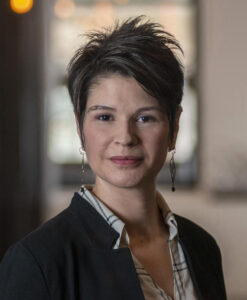Alyson Brooks

Biography
Alyson Brooks is a theoretical astrophysicist who interprets observational results in the light of galaxy formation theory. She is a major user of high-performance computing, creating some of the highest resolution simulations of galaxies ever achieved, following galaxy evolution from soon after the Big Bang to the present day. Her work has helped to pioneer a revolution in the way that physicists view galaxy formation: the physics of gas and stars can alter the dark matter structure of galaxies. Thus, Dr. Brooks is an expert in both the formation of galaxies as well as astrophysical constraints on the dark matter model. She is interested in how AI can help to speed up cosmological simulations through learned modeling of the sub-resolution physics inherent in galaxy formation simulations.
Dr. Brooks earned a B.A. in physics from Macalester College in 2000 and a Ph.D. in astronomy from the University of Washington in 2008. She was a Sherman Fairchild Postdoctoral Fellow at Caltech from 2008 to 2011, and the Grainger Postdoctoral Fellow at the University of Wisconsin, Madison from 2011 to 2013, before joining the faculty at Rutgers, the State University of New Jersey. She was the recipient of a 2015 Alfred P. Sloan Research Fellow, and the American Physical Society’s Maria Goeppert Mayer award in 2019. She was presented the Outstanding Teaching Award by the Rutgers Society of Physics Students in 2016, the 2017 Rutgers School of Arts & Sciences Award for Distinguished Contributions to Undergraduate Education, and the 2019 Rutgers Presidential Fellowship for Teaching Excellence. She received the 2019 Rutgers Board of Trustees Research Fellowship for Scholarly Excellence. Dr. Brooks co-leads “Cyberinfrastructure and AI for Science and Society (CASS),” selected as a 2023 Chancellor-Provost Challenge award.